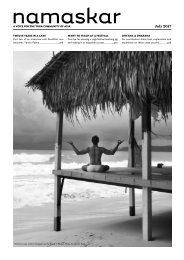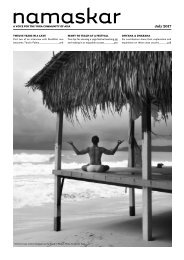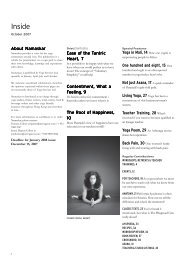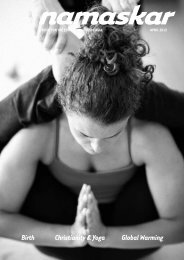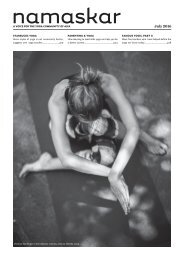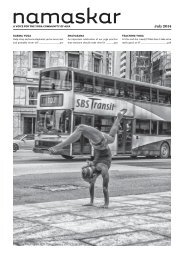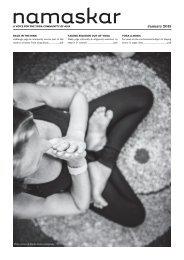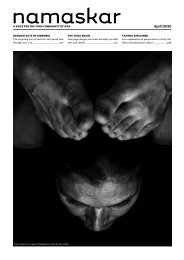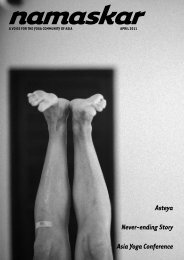Create successful ePaper yourself
Turn your PDF publications into a flip-book with our unique Google optimized e-Paper software.
<strong>Namaskar</strong> • A Voice for Yoga in Asia<br />
Opinion<br />
Doing what my<br />
body wan<br />
ants<br />
Paul Dallaghan<br />
A line often mentioned by students about<br />
their practice is “I did what my body felt like<br />
today”. I believe it is good to listen to the<br />
body, as this indicates a highly developed<br />
inner sense. If this sense is operating accurately then one<br />
must have achieved a certain level in yoga.<br />
I would say when the body is fatigued, or when there is a<br />
fever, then this is the time to modify or not practice. But<br />
what I often see is students ignoring signs telling them not<br />
to practice , or more commonly, students using any<br />
condition to change or back out of a practice.<br />
Yoga is a powerful practice which has been given to us so<br />
our true self may be revealed. Yoga says our true nature is<br />
covered up by many layers, our thought processes and<br />
ability to comprehend things are clouded. The path of yoga<br />
has been passed on to help clean us up and pull us out of<br />
confusion. We all have within us the capabilities and the<br />
need to find this clarity, we just need to practice according<br />
to the science of yoga.<br />
It is self-defeating to say “I did what my body wants today”<br />
as such an approach keeps one in the same rut, going<br />
around in circles without any hope of growth. It is ego driven<br />
to think that “I” know better and go against what those<br />
wiser than us have passed on. The decision to not practice<br />
or deviate from what your teacher has prescribed is usually<br />
an emotionally-driven whim.<br />
If one follows a prescribed course for a period of time, one<br />
will see the results, observing rationally what needs to be<br />
changed or done next. But when we fluctuate with daily<br />
whims we achieve nothing.<br />
In the Yoga Sutras, the authoritative text on yoga, Patanjali<br />
points out the obstacles that get in the way of our practice.<br />
They are physical ailment, lethargy, unreasonable doubt,<br />
carelessness, laziness, undisciplined senses, imaginations,<br />
inability to reach higher experiences, and non-retention of<br />
the achieved experiences.<br />
Practicing according to “how I feel” falls under these<br />
obstacles. To conquer them Patanjali advises students to<br />
practice sincerely over time, with a focused mind and<br />
following the one-pointed practice a teacher has given you.<br />
Patanjali acknowledges obstacles will arise and one must<br />
practice to overcome them, even when one is injured.<br />
Perhaps a period of rest is necessary, followed by<br />
modification in practice. Through consistency and time the<br />
physical or mental ailment is conquered. By practicing even<br />
when we don’t feel like it, other obstacles aren’t given the<br />
space to sprout up and affect us even more.<br />
We should acknowledge that it is normal for the mind to<br />
rebel and lead us astray. And then we should remember this<br />
when the mind seeks variety, or a reason to not practice. If I<br />
am weak or have a fever then to limit, or stop my practice is<br />
justifiable. When I am not, then it is of most benefit to follow<br />
the teacher’s instructions and just practice. The state of<br />
yoga is a calm, undistracted mental state, ultimately beyond<br />
the fluctuations of the mind.<br />
There is typically a lack of understanding, by the student, of<br />
the subtle inner process that is taking place during practice.<br />
Only towards the end of a “clearing” or progression in their<br />
practice is the process understood. Changing or stopping in<br />
the middle of this inner change is like pulling a cake out of<br />
the oven before it is ready.<br />
So the practice of yoga focuses and calms the mind; in<br />
essence it builds tremendous mental strength. This can only<br />
be achieved when one follows the prescribed practice daily.<br />
If we pull back the wheel of time and look out over, 10 to 20<br />
years we will find much variation in practice. Yet we will see<br />
that it has come from progression. A certain practice was<br />
followed, a stage achieved, the next step moved on to, and<br />
so on. But we can so often get stuck in the immediate and<br />
suffer from this impatience and weakness of mind.<br />
The truest and greatest benefit comes from following a<br />
teacher-given practice each day. That practice then<br />
18



